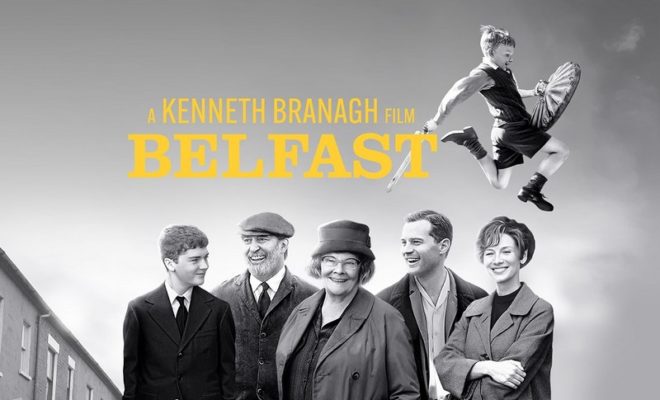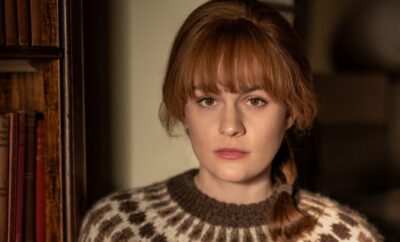
Movie Reviews
Belfast
By: Jennifer Vintzileos
In our current political and social climate it’s always important to remember where we came from and how far we still have to go. In Kenneth Branagh’s recent film Belfast, his portrayal of Northern Ireland during “The Troubles” is a stark reminder that many of us still face the age-old question: Should we stay or should we go? And, of course, what the ramifications can be of that result.
Belfast focuses on the life of nine-year-old Buddy (Jude Hill) and his family living in Northern Ireland during the riots of 1969. As Protestants continue to try pushing the Catholics in their neighborhood out, Buddy’s Ma (Caitriona Balfe) and Pa (Jamie Dornan) grapple with the decision on whether they should move their sons Buddy and Will (Lewis McAskie) out of Belfast or remain there amidst the chaos. Buddy takes refuge in spending time with Granny (Judi Dench) and Pop (Ciarán Hinds) for advice, as well as interest in fellow Catholic classmate Catherine (Olive Tennant) and a keen love for films. Buddy manages to continue living his life while trying to avoid Pa’s former classmate Billy Clanton (Colin Morgan) and his persistence to join the cause of the rioters. As the social climate continues to worsen in Belfast, Buddy continues to question which way is the right path while the toughest decisions about the well-being of his family have yet to be made.
What truly makes Belfast a great film goes beyond the story, which writer and director Kenneth Branagh manages to execute almost seamlessly. You are drawn in by Buddy’s perspective, which does not feel forced or fabricated. It is obvious that you are looking through the eyes of a child rather than an adult trying to be a child. Even when you’re watching the numerous films that Buddy views on television or on the cinema screen, there’s also the real elements of the tension between Ma and Pa simmering in the background noise or Granny’s excitement in sharing Buddy’s love of film. Yet what makes this story so special, aside from Jude Hill’s admirable acting chops, is that Branagh drew from his own childhood experience in Northern Ireland to write the story. And knowing that little tidbit makes Belfast a much more personal tale. Branagh’s ability to bring you down to his level as a child makes you feel you are experiencing these moments with Buddy as though you were sitting right next to him.
Almost as iconic as the perspective of the story are the relationship parallels between Ma and Pa versus Granny and Pop. Balfe and Dornan bring the fine line between passion and tension to a new level, conveying just how nerve-wracking and destructive The Troubles were for the family. It’s obvious that the love is there despite the tension, evident in moments where Pa is spinning Ma around in the streets or singing “Everlasting Love” to her while she looks on lovingly. But I’m all about the way Dench and Hinds quietly flirt and remind one another of how that passion can still exist even in old age. Branagh really made sure that Granny and Pop’s dialogue packed a subtle punch while giving the main story focus.
And last, but certainly not least, the music. Rather than creating a soundtrack with various artists save for at least one or two iconic songs, Belfast native Van Morrison was heavily featured throughout the film. The use of songs like “Days Like This,” “Warm Love” and “Stranded” during more than appropriate scenes not only fit the theme, but also the time period itself. Just as much as dialogue and proper casting, music plays a pivotal role in the tone of a scene, which is why using a song like “Carrickfergus” when the conflict deepens between Ma and Pa staying or leaving Belfast makes sense. You are drawn in by the lyrics and feel of the melody to the scene.
Belfast is a story that will make you laugh, cry and everything in between. But, most importantly, it will leave you wondering and questioning those tough choices that need to be made in times of conflict. And is there ever a right answer? I think Branagh’s final dedication of the film reminds us that it can be all of the above – “For the ones who stayed, for the ones who left and for all the ones who were lost.”





You must be logged in to post a comment Login